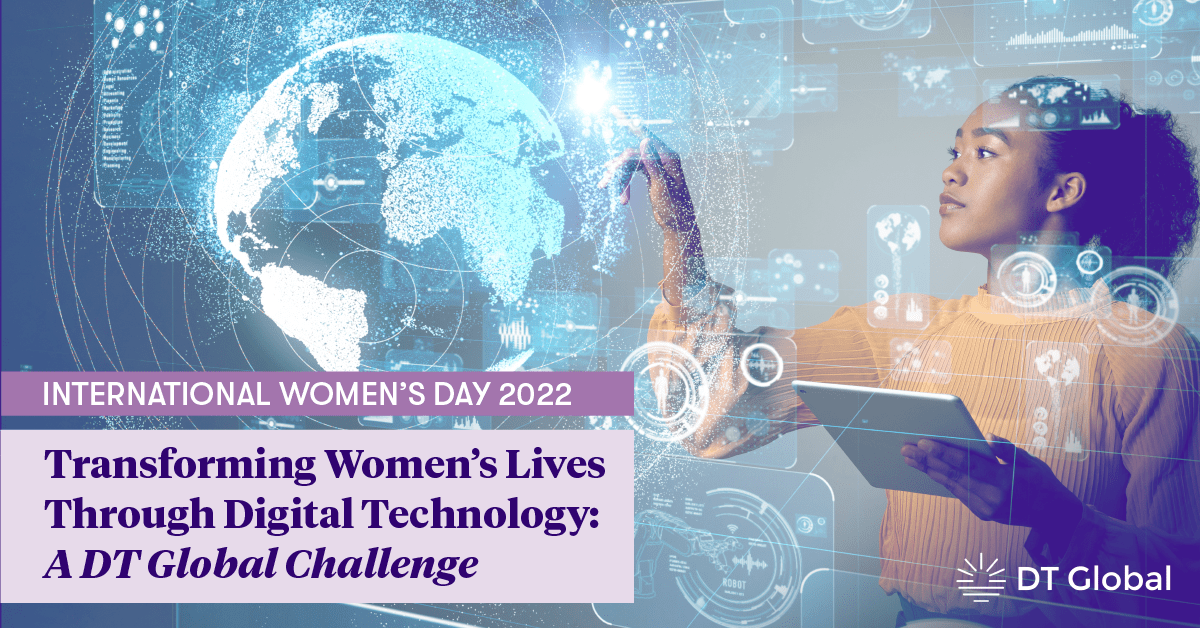
Today, March 8, DT Global celebrates International Women’s Day—an annual reminder that the push for women’s equality and equity is both important and unfinished. International Women’s Day also gives us a chance to celebrate the accomplishments of women and girls, and to remember that these accomplishments will fuel the ingenuity, dedication, and empowerment of future generations.
Digital technology connects and transforms human life. But the inverse is also true—the less we have access to the transformative power of digital technology, the more we are left out and left behind. This disparity plays out across every societal divide: rich and poor, rural and urban, and of course, male and female. Worldwide, men are 21% more likely to be online than women, with that number rising to 52% in the least developed countries. This lack of access is both a result of, and a contributor to, the economic, social, educational, and political inequality between genders.
This spring, a group of DT Global staff across our Australia, Spain, and US offices are setting out to answer that question through an incubator challenge—launching on International Women’s Day—for women-owned social enterprises: Transforming Women’s Lives Through Digital Technology.
“In a pandemic and post-pandemic world, digital technology has been the most disruptive tool in every field,” says Tamara Amor, Corporate Social Responsibility Coordinator for DT Global. “Women have fewer possibilities in the digital world, and sometimes they’re even made invisible, so we thought we could create a space that would support women-led projects that are making a difference through digital technology.”
This challenge pairs DT Global mentors with social enterprises to develop a concept that advances female economic or social empowerment through digital technology. All organizations will receive mentorship and access to ideas and networks throughout the challenge, and the winning organization will receive seed money to launch their idea.
Our teams hail from Venezuela, Spain, Papua New Guinea, Samoa, and Australia—and work with women in countries across the world. We sat down to learn more about our participating social enterprises and what it is that drives them to do the work they do.
Impact Hub Caracas is a community of entrepreneurs in Venezuela established to inspire other entrepreneurs, connect them with local and international communities of peers, and support them through mentorship and training services. Impact Hub Caracas is growing its Young Women Techpreneurs program, which will help young Venezuelan women (aged 17-25) launch their own tech businesses and gain financial independence by teaching entrepreneurial and STEM skills and creating a safe space for networking, dialogue, exchange, and learning among participants.
ITWILLBE is a Spain-based social innovation NGO working in India. ITWILLBE helps to realize the full potential of India’s self-help group system in the digital age by using digital resources to increase women’s employment and accelerate growth of vulnerable women-led businesses.
One Girl, an Australia-based NGO, works in Sierra Leone and Uganda to drive positive change for girls and their communities. One Girl is working through Girl Tok, a digital program for which it is co-designing relevant content about financial literacy, savings and loans groups, mobile money, access to markets, and more.
Vaoala Vanilla, based in Samoa, is a sole proprietorship that has cultivated and sold vanilla for over 15 years, including through digital platforms. Vaoala Vanilla wants to build women-focused digital and e-commerce opportunities through training and mentorship opportunities that help Pacific female entrepreneurs become more confident in the e-commerce space.
Sere J Pacific Ltd. is a Papua New Guinea social enterprise that supports innovative small-scale, locally driven, entrepreneurial approaches to solve rural poverty. It is developing a “farmer’s portal” to create a one-stop shop for farmers and fishers, with a goal to meet information needs relating to agriculture, fisheries, animal husbandry, sale/storage of farmer produce, weather, current market price, e-commerce, and digital payments.
We are so excited to work with this group of dynamic women as they develop their concepts to bring equality for women and girls through digital innovations. “The fact that many women today have less access to digital technologies means that they are left behind where we need them the most,” says Louise Williams, Senior Director for Economic Growth at DT Global. “We believe this initiative will help women carry out digital projects in areas that are critical for other women.”